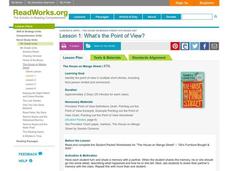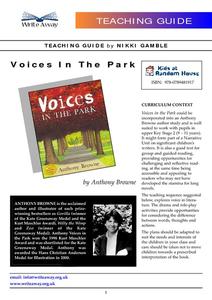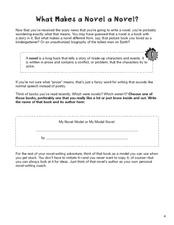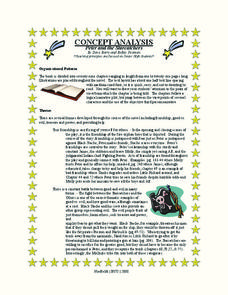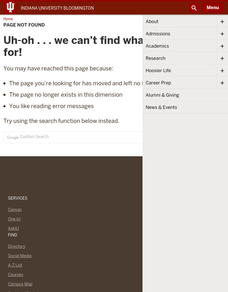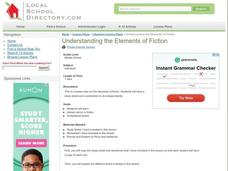K12 Reader
Change the Point of View: First Person and Third Person
How is a story different when told from various points of view? Learn about first and third person points of view with an activity based on Robert Louis Stevenson's Treasure Island. Readers examine a passage written in first person, then...
K12 Reader
Change the Point of View: Third Person to First Person
Use Jack London's The Call of the Wild to help young writers learn the difference between first and third person points of view. After they read a passage from the novel, they rewrite it in the first person point of view.
Curated OER
What's the Point of View?
Sixth graders explain what a point of view is. They list two different types of examples of third person point of view and identify the difference between a third person limited and third person omniscient . Additionally, they read a...
Manchester College
What’s Your Point of View?
Work on deciphering the point of view of various pieces of literature. As readers review the concepts of first, second, and third person perspective, they apply what they know to different passages.
K12 Reader
Narrator’s Point of View Flow Chart
How can you tell what point of view a narrator is using, and why does it matter when reading or writing? Use a handy flow chart to determine whether or not your narrator is telling the story from a first or third person point of view.
Write Away!
Voices In the Park
Explore the impact a narrator's point of view has on a story with a reading of the children's book, Voices in the Park by Anthony Browne. Written in four different voices, the story is told and retold from different perspectives to...
Premier Literacy
Point of View
Incorporate technology into a literature lesson with an innovative language arts lesson. Middle schoolers read an electronic version of original stories or fairy tales, and after determining the point of view, rewrite the tale from a...
Curated OER
Elements of Fiction
The metaphor of a pot of soup and a series of colorful templates remind young writers of the elements that make for a rich story. Pepper the plot with carrot/character, potato/point of view, corn/conflict, tomato/theme, and season with...
Curated OER
What Makes a Novel a Novel?
As your authors prepare to write a hypothetical novel, they need all the inspiration they can find! Using a book they have already read (and enjoyed), learners complete a literary analysis by filling in eight short-answer questions....
Curated OER
Genre Lesson: Biography/Autobiography
Practice distinguishing biography from autobiography through point of view. Tell a brief story of your morning. Have a class member retell the story to you (using second person). And have another retell the story to the class (using...
Curated OER
Writing Sentences Lesson Plan
Students explore first person and third person points of view. In this perspective instructional activity, students identify first person and third person points of view in literature they have read. Students rewrite stories from...
Curated OER
Number the Stars, Lesson 11
Students analyze point of view in the novel Number the Stars. Their writing prompt is how would this chapter(11) be different if Peter were telling the story? Students create a class concept web about pride on the board.
Syracuse City School District
Literary Elements
Address the literary elements in a piece of writing using these materials. The packet includes plenty of resources, and focuses mainly on theme, character, and point of view, with some materials for setting, symbolism, and author's...
MENSA Education & Research Foundation
Magical Musical Tour: Using Lyrics to Teach Literary Elements
Language arts learners don't need a lecture about poetry; they listen to poetry every day on the radio! Apply skills from literary analysis to famous songs and beautiful lyrics with a instructional activity about literary devices. As...
Blake Education
Harry Potter and the Philosopher’s Stone
The motto for Hogwarts School of Witchcraft and Wizardry warns that one should never tickle a sleeping dragon, but learners will definitely be tickled by the activities in a packet of materials designed to accompany a reading of the...
Poetry Society
Writing a Personification List Poem
After a close reading of Sylvia Plath's "Mirror" and Flora de Falbe's "Five Things About the Lake," young poets craft their own personification list poem about a very special place.
Curated OER
Laurence Yep's, Dragonwings
Students discuss vocabulary words and compare definitions. They read chapters 6-9 of the novel, Dragonwings, and discuss point of view, and complete a plot diagram. Then they review the four types of conflict and identify the conflicts...
Curated OER
Peter and the Starcatchers: Concept Analysis
Are you preparing to teach Peter and the Starcatchers? If so, you'll want to take a look at this analysis of the text, which describes plot and literary elements in-depth and explores potential implications related to diversity and...
Curated OER
Your Story, My Story
Students write from differing points of view, and act out stories in pantomime as another student narrates.
Curated OER
Understanding the Elements of Fiction
Inform your class on the elements of fiction: themes, settings, characters, plots, dialogue, narration, flashback, clues, climax, resolution. They write the definitions of the terms on the worksheet provided.l Tip: Have them write a...
Curated OER
During Reading Strategy for Charles Dickens’ Great Expectations
Readers create a literary scrapbook for one of the characters in Charles Dickens' Great Expectations and fill it with mementoes, journal entries, letters, etc. A great way to get kids to think about characterization.
Curated OER
Author's Day
Have your learners choose an author to study. One resource link gives a list of approved authors. Scholars read at least three works produced by that author and produce three separate book reports as well as a two-page author report....
Curated OER
Laurence Yep's Dragonwings
Students read independently the novel, "Dragonwings," by Laurence Yep and make connections between a text and the world. They summarize, paraphrase, analyze and evaluate skimming and scanning techniques when reading a novel. Each student...
Curated OER
Study Guide: The Sniper
In this study guide worksheet, middle schoolers must define vocabulary and literary terms found in the short story "The Sniper". Students cite examples of literary terms usage and answer comprehension questions.




